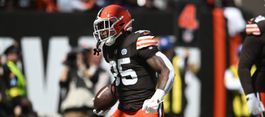While Superflex and two-quarterback leagues have become more prevalent in recent years, the most popular option for redraft leagues remains the tried-and-true single-QB format. In these leagues, avoiding early-round QBs and streaming the position is a viable strategy and often an optimal one.
Assuming you play in a 10 or 12-team single-QB league, there will be interesting QBs available on the waiver wire all season long. Therefore, you should never struggle to find an available streaming option. That, plus the annual uncertainty over which (if any) early round QBs will distance themselves from the competition, is why it is generally wise to prioritize running back and wide receiver in the early rounds of your draft.
That’s not to say you should only draft a single late-round QB and then cycle through waiver wire options each week, the way you might stream pitchers in fantasy baseball. However, even in single-QB formats, getting ample points from the position is too important to treat casually.
Roster Construction: A Placeholder and a Prospect
Even if you leave your fantasy draft without a set-in-stone every-week starter at QB, your goal should be to have one by the end of the season. That’s why it’s best to devote two roster spots to the position early in the season, one for a steady, high-floor/lower-ceiling performer who can be your immediate starter and one for a more boom-or-bust upside stash.
The immediate starter you roster will typically be an established veteran with good weapons. Conversely, the upside stash will typically be a first or second-year starter or a former star coming off injury or suspension. He’ll ideally provide some element of rushing ability.
The players you select to fill those two roles can change in-season. While you may come out of your draft with Kirk Cousins and Trey Lance, you could decide after a couple of weeks that Matt Ryan is a better immediate starter than Cousins or that Trevor Lawrence is a better upside stash than Lance.
For help with this as you approach your draft, use our quarterback by committee tool.
Streaming Based on Matchups
Unlike the upside stashes, the steady veterans will have a weekly value that is very matchup-dependent. This is where streaming truly comes into play. Every year, at least five to 10 QBs are capable of producing top-12 numbers against soft defenses but are extremely dicey options against stronger defensive units.
However, because the top defenses in the NFL shift so much from one year to another, you should try to wait at least four or five weeks into the season before you start heavily incorporating matchups into your streaming decisions. Defensive data from previous seasons is simply not that reliable.
However, once the defensive data stabilizes, it becomes a very valuable tool. You’ll want to start by looking at which defenses allow the most fantasy points to QBs, but you’ll also want to dig deeper to fully grasp what those surface numbers mean.
For instance, some defenses are especially vulnerable to rushing QBs, which won’t do much good if you plan to start an immobile, statuesque passer against them. Other defenses are stingy in terms of passing yards allowed but look like good matchups on paper because they have given up a disproportionate number of passing touchdowns. Those units will look much tougher against the pass once that TD variance normalizes, so you should prioritize yardage over TDs allowed.
It’s also important to look at which teams a defense has faced. Any defense that begins the season against Josh Allen, Patrick Mahomes and Justin Herbert will look vulnerable against the pass, but that doesn’t mean they will struggle against Carson Wentz. So anytime you see a listing of “schedule-adjusted fantasy points allowed,” it accounts for this factor.
Then there is how that defense has performed recently. Often, teams go through phases within the season where they are better or worse against the pass due to injuries to key defensive playmakers, schematic/coaching shifts, or other factors. A truly favorable matchup is against a defense currently in poor form.
If this sounds like a lot of work to figure out each week, you can always rely on the most accurate in-season QB rankers. But you better believe they are taking all of these factors into account.
Mid/Late-Round QBs To Target For 2022
The following QBs are broken down into the two groups outlined above: First, steady, immediate starters, and second, boom-or-bust upside stashes. The QBs are listed in order of 2022 redraft appeal within each category. All QBs listed are going outside of the top-12, according to FantasyPros’ latest average draft position (ADP) data.
Steady Starters: Derek Carr (QB – LV), Kirk Cousins (QB – MIN), Jameis Winston (QB – NO), Matt Ryan (QB – IND), Ryan Tannehill (QB – TEN)
Upside Stashes: Deshaun Watson (QB – CLE), Trey Lance (QB – SF), Trevor Lawrence (QB – JAX), Zach Wilson (QB – NYJ), Justin Fields (QB – CHI), Tua Tagovailoa (QB – MIA), Daniel Jones (QB – NYG), Mac Jones (QB – NE)
Subscribe: Apple Podcasts | Spotify | Google Podcasts | Stitcher | SoundCloud | iHeartRadio
If you want to dive deeper into fantasy football, be sure to check out our award-winning slate of Fantasy Football Tools as you navigate your season. From our Start/Sit Assistant – which provides your optimal lineup based on accurate consensus projections – to our Waiver Wire Assistant – which allows you to quickly see which available players will improve your team and by how much – we’ve got you covered this fantasy football season.
Andrew Seifter is a featured writer at FantasyPros. For more from Andrew, check out his archive and follow him @andrew_seifter.










